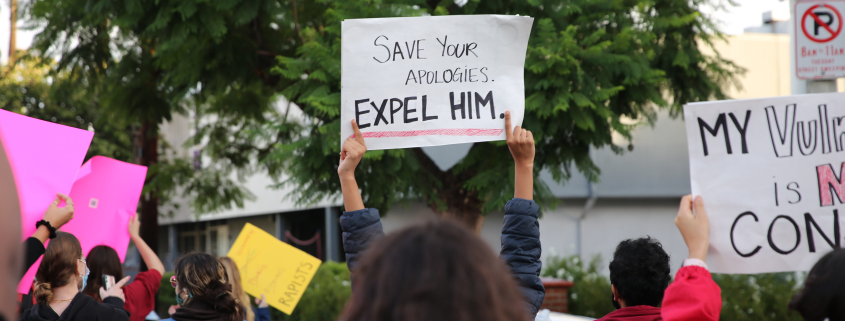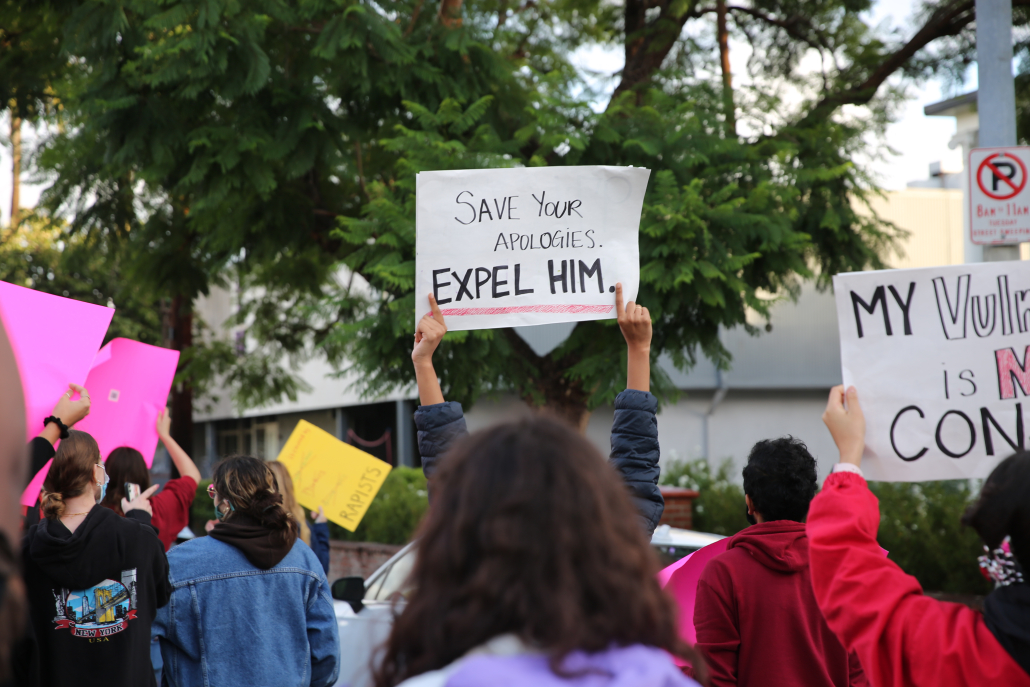The Sigma Nu incident is not surprising
Content warning: This article contains references of sexual assault, drugging and violence.
The breaking news of sexual assault allegations arising from USC’s Interfraternity Council chapters drove students to protest and demand accountability at the Row. These instances come as horrifying, even surprising to some students.
And yet, USC managed to entangle itself in another major controversy, one for which — in all honesty — it did not do enough to prevent. The University’s required consent modules and workshops are laughably shallow and trivializing, and USC must now suffer the consequences for its lack of retrospective action.
The University’s consent and sexual harassment education guides students through roleplaying situations where young adults find themselves in sexually ambiguous situations. Students watch scenario videos and answer “what to do’’ questions.
While this format aims to engage students, it reduces the severity of sexual assault and consent to a few hours and a couple dozen questions. When the University presents this material to students in a homework-like format, it should not come as a surprise when students treat it that way.
In an interview with VICE, Donna Freitas, a leading researcher on consent and sexual harassment and author of “Consent on Campus: A Manifesto,” describes similar university modules and workshops as, “the result of scarce resources Student Affairs receives in order to tackle a highly complex problem,” and it’s impossible to disagree.
As upsetting as it is, the 17 reported incidents of sexual assault in the past month may possibly initiate tangible change in the “Trojans Respect Consent” realm. Ironically, this entire sexual assault awareness system was only implemented at the beginning of the 2019-2020 school year. Two years later — and after 18 months of the coronavirus pandemic — the system is already failing.
While it is easy to criticize USC’s lack of commitment to addressing sexual assault, there is not one simple solution. However, it is blatantly obvious that, given the resources that the school possesses, a lot more should be expected.
One of USC’s biggest problems with its consent curriculum is its lack of discussion about the repercussions of sexual offenses. The curriculum focuses on the do’s and don’t’s of approaching a sexually ambiguous situation: Don’t try to engage with someone who is intoxicated; if they don’t seem interested, don’t push.
Most students know about these situations before entering their college years, and, while it is extremely important to review these aspects to ensure all students are on the same page about consent and sexual understanding, it is even more important for students to understand the repercussions of their actions if they choose to act in a malicious manner.
To better understand this gaping hole in the school’s consent education system, students can ask themselves the following questions: California defines sexual assault as any form of unconsenual sexual touching, but what counts as a misdemeanor and what counts as a felony? What penalties can come from a sexual assault misdemeanor? Instead of reading scripts and enacting role plays over Zoom meetings, our consent modules should more intensely instill the retribution that would come from a conviction.
However, our society severely normalizes sexual assault and most rapists face no retribution, making any type of change disturbingly not feasible.
So, what can be done to try and change the way students are taught about consent? In studies and research efforts such as Rebecca Ortiz’s “Define Your Line” campaign, college students were taught consent from an approach that directly addressed sexual misunderstandings based on societal gender stereotypes. The study also reached out to groups with lack of racial diversity, such as Greek life organizations, to maintain secure connections with them that emphasized consent education, and the results from the research project demonstrated that these practices may be worth incorporating into more general sexual consent guidance.
Diverging from more stereotypical consent education, the University could more directly emphasize respect among college students.
Lack of respect is the greatest inhibiting factor between creating a study body that does not engage in sexually inappropriate behavior or fraternities that do not attain national coverage for a date-rape scandal. There have to be forced discussions about non-sexual respect, ones that humanize students and address the severity of what enduring any form of harassment may procure in the long run.
If, for no other reason, USC should take these drastic measures for the victims of IFC chapters’ assaults. All Trojans must be aware that their actions have consequences. And all Trojans must be aware that every person they interact with is a person who may remember that interaction, no matter how big or small.


